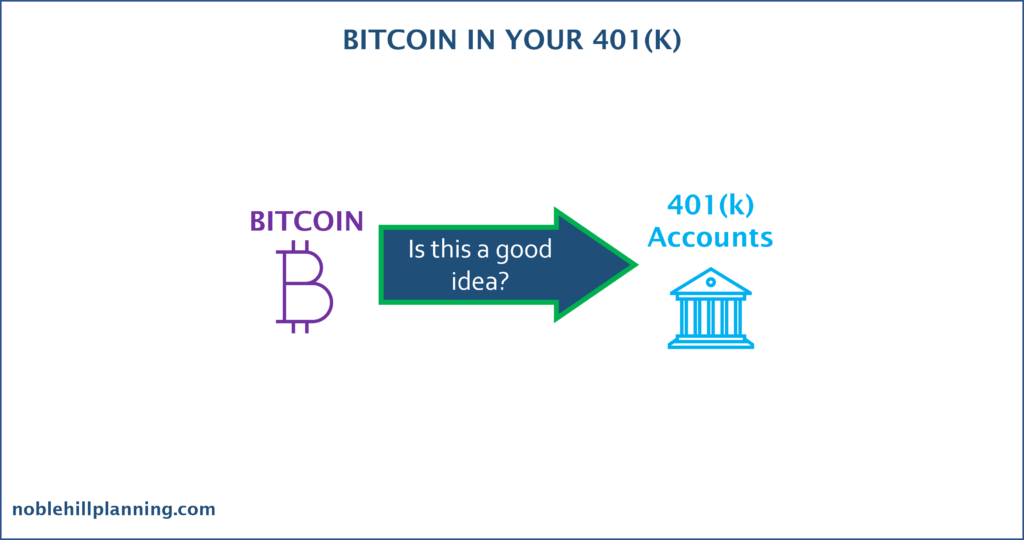
Fidelity recently announced that they will allow 401(k) plans to offer bitcoin as an investment alternative. Wow! Brett Arends at MarketWatch posted a good article about why this is a bad idea.
From the employer’s side
Fidelity claims that they are making this change because customers asked for it. That may be true, and I’m not going to dispute Fidelity’s rationale. But if I was an employer, I would think long and hard before adding bitcoin to my employee’s retirement nest egg.1
We sometimes forget, but employers offering a 401(k) have a fiduciary duty to act in the best interests of the plan participants. However, employers don’t always do a very good job with this. They get sued all the time by 401(k) participants in response to shady or irresponsible behavior.
Sometimes employers do their best, but the complex rules and high costs around 401(k) plans get in the way. John Rekenthaler at Morningstar has even argued for streamlining the retirement plan system in this country by just having every employer use one big 401(k) plan.2
Everyone knows someone who has a “terrible” 401(k) plan. Many of these plans are at small or mid-sized employers and they often include high admin and record keeping costs, high-cost investment options, and a stingy employer contribution. Sometimes the employers don’t know any better and just get sold a bad product. Sometimes the employers are trying to shift the costs of the plan onto the participants. In either case, employees end up paying the price.
Adding bitcoin to the mix doesn’t offer much of a solution to these issues. In fact, it could compound the risk for employers… and employees.
From the employee’s side
Should an employee add bitcoin to their 401(k) account if their employer allows it? I can’t answer that question. But keep in mind that bitcoin is not an investment asset in the classical sense.
Sure you can make money by buying bitcoin, and many people have. But bitcoin is simply a novel form of currency, much like US dollars, British pounds, or Japanese yen. Instead of the backing of a major government, bitcoin is backed by mathematics. And bitcoin is certainly not a productive asset. Unlike things like farmland, real estate, machinery, software, etc., bitcoin doesn’t produce any economic value. The technology that underlies bitcoin (blockchain) offers the potential for new economic growth, but bitcoin itself is just entries in a ledger.
And as Arends points out, if you have any care at all about climate change and you invest in bitcoin, then you’ll likely experience some interesting cognitive discord. Bitcoin as a system uses the same amount of electricity as Poland. Pretty much for nothing. Can you imagine a better use for all of that electricity? I can imagine about 100.
If you do choose to invest in bitcoin, consider using a regular taxable account. It may help save on taxes. If bitcoin goes up in value and you hold it for a year, your gains are subject to lower long-term capital gains tax rates. And if bitcoin goes down, you can harvest tax losses. In addition, bitcoin is not currently subject to IRS wash sale rules, so after you sell to harvest your tax loss, you can simultaneously repurchase.
Also keep in mind that Fidelity isn’t doing this out of the goodness of their hearts. Fidelity’s press release indicates that the bitcoin investments will be facilitated using a specialized Digital Assets Account (DAA), which will hold bitcoin as well as enough cash to accommodate transaction costs. The annual fees on the DAA will be around 0.75% and 0.90%.
I’m always suspicious of gimmicks in the financial world. And this move by Fidelity smells like a gimmick. But who knows, I could be wrong.
At the end of the day, we’ll have to see how all of this plays out. If bitcoin goes up from here, then Fidelity (and any employer that adds bitcoin as an investment option) will look like a genius. But if bitcoin crumbles like a house of cards (I’m not saying that it will), then a lot of employees won’t be very happy, and Fidelity (and the plan sponsors) will be in a tough spot to defend their actions.
For me, I’m trying to remain hopeful that someday all of these digital assets will actually DO something to improve our lives and make the world a better place. But at this point, I’m not sure that they can.
1 It doesn’t appear that the Department of Labor (DOL) is very happy about all this (see here).
2 And I have to say that makes a ton of sense.

